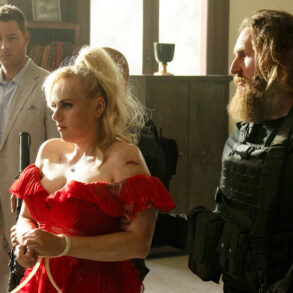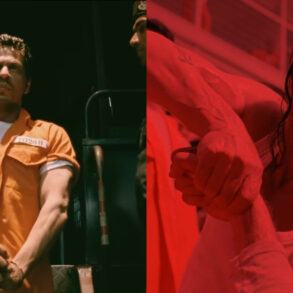
Photo: Chuck Hodes/FX
Spoilers follow for the entirety of Justified: City Primeval, including the August 29 finale episode, “The Question.”
FX’s Elmore Leonard adaptation Justified was a nearly perfect six-season show about U.S. Marshal Raylan Givens, the town in which he grew up, the family he couldn’t wait to escape, and the frenemy, Boyd Crowder, with whom he used to dig coal. It was good television, with perfect chemistry between Timothy Olyphant as the laconic, smart-ass lawman and Walton Goggins as the talkative, smart-ass outlaw, and a wide array of supporting characters who were in tune with both the series’s evocation of Leonard’s quirky dialogue and its version of the hardships facing rural America and its working class. This summer’s sequel series, City Primeval, mostly only brought back one of those things — Olyphant’s Givens — but placed him in the new location of Detroit and against a new baddie in Boyd Holbrook’s Clement Mansell. It all felt very distant from Harlan, Kentucky — until the last 10 minutes of finale episode “The Question” made TV critics and hardcore Justified fans Roxana Hadadi and Kathryn VanArendonk wonder what worked in City Primeval, what didn’t, and what could have been.
Roxana Hadadi: Kathryn, let me take you back in time to when I learned that Justified was coming back. I was so happy! Have I been happier? Who can say! What I can say, though, is that while watching Justified: City Primeval, I never again felt as happy as that moment when I imagined what it would be like. It’s not that I loathed City Primeval: I recapped it, and I think there are certain elements of the miniseries that are intriguingly considered. What does quick-draw Raylan look and act like 15 years into being a dad and no longer in Harlan, the place that sometimes made him his worst self? Has he maintained his moral center in a time where the actions of law enforcement officers are more vocally criticized? I think City Primeval at least attempted to pose those questions about Raylan, and Olyphant’s always given the character a thoughtful and deliberate edge that I think contrasted well with the wildness of Detroit.
At the same time, though, I never got over feeling that this wasn’t really a Raylan story. Not just because the Leonard novel on which it’s based has nothing to do with our favorite U.S. Marshal, but also because I’ve always thought of Justified as a two-hander between Raylan and Boyd, his former friend turned enemy turned frenemy. Describing them in those terms is a little silly, forgive me. But I’ve always considered them spiritual twins; you understand Raylan more with Boyd around, and you understand Boyd more with Raylan around. Without that element, is this really Justified? I’m still wavering on that.
We’ll get to how this miniseries handles Boyd’s absence, but first, Kathryn, how did you feel about City Primeval overall? Were you, like me, increasingly disappointed with the absence of OG characters like Wynn Duffy and Rachel Brooks (which is to say … the entirety of City Primeval’s run time)?
Kathryn VanArendonk: I went through stages with City Primeval. First it was cautious but undeniable pleasure: my man Raylan is back, he’s driving a car, he’s got a guy in handcuffs, he’s even been scolded in interesting ways for his familiar habit of taking the law into his own hands. And then, very quickly, the frustration set in. City Primeval never fully fell into that sinking, stomach-churning zombie place that can happen with revivals — it was never the upsetting sense that your lover had returned but now he was something else. Something bad. It was more like a series of momentum missteps. Nothing clicked quite right, especially early on. The mood would occasionally feel good. The baddies and the skeptical colleagues were fine. But it never had the same sparkling sense of the original, which at its best had the zipping thrill of a long lit fuse.
As I kept watching, as I started to get more on board with this new show’s tempo and its world, those two opposing impulses were a little easier to temper against one another. It was never original Justified, but especially toward the back half of the season, it could sometimes find its own groove. I’m absolutely with you, though: I never, ever got over the absence of Walton Goggins. He has such a distinctive energy, and without him the show just felt flat.
R.H.: There is no replacing our man, even with another man named Boyd. It doesn’t work! And while I am mostly a defender of the miniseries as a form, so much of City Primeval felt underdeveloped from episode to episode, giving it a bagginess that I think hurt the effort overall. Detroit never really seemed like actual, authentic Detroit (probably because so many scenes were inside nondescript buildings like senior centers, hotels, and police stations), whereas the geography (and geology) of Harlan had been so important to the original Justified. We eventually learn that the Detroit cops are supposed to be bad at their jobs because they’re covering up their own malfeasance, but I felt like City Primeval even dumbed down Raylan, who had been a great investigator and reader of people and lacked some of that second nature here. I’m not even sure what to say about the Albanians — it’s very much a Leonard thing to slide hyper-violent baddies into his stories to amp up the level of danger, but they just felt like a random element that never gelled with anything else. If you asked me what year or location City Primeval was in, I never could have told you “2023” and “Motor City.”
I kept watching, though, because of Olyphant, who has such a strong grasp of this character, his moral center and physicality, and the way he uses sarcasm, humor, and evasiveness to make peace with being a lawman. So given all that, Kathryn, how did you feel about the first part of this miniseries’s ending, and the choice Raylan makes?
K.V.A.: I think if the first part had not been followed by the second part, I’d have been fine with it. My man Raylan has had a good run, except for all the parts of the run where he was very clearly breaking the law and treating citizens in illegal and often violent ways. I appreciated that the show addressed his behavior; I appreciated the idea that Raylan would also come to realize that for himself, for his daughter, and also for the rights of everyday people around him who maybe didn’t want to get thrown in the back of his vehicle with a little additional force, it might be time to retire.
From a storytelling perspective, it’s frustrating that he might come to that realization after this much less personal case rather than realizing it at the end of the original series. I don’t care how much fun he had with Aunjanue Ellis, or how much he might’ve come to enjoy a Detroit Coney Dog. It was weird for Raylan to make any important life decision outside of Harlan County. Even so, the character arc mostly worked. Raylan’s always been about soft spots for the women in his life. The idea of him quitting so he can hang out with his daughter feels right.
Except then, the second part of the finale happened. And then my feelings went … left. Please help me process this!
R.H.: Kathryn, I’m not sure we can process it! It might be too much! It blew up what might be my favorite TV ending of all time! But before we dive into that, let me just briefly say that while I mostly agree that Raylan hanging up the hat (not literally, you know what I mean) made sense for how long he’s been doing this job and for how much killing Holbrook’s Mansell rattled him, it annoyed me, as someone who has read City Primeval, that the series basically gives us this ending twice. First, it’s when Raylan meets with former detective Raymond Cruz, a recurring Leonard character played by Paul Calderón in a reprisal of his role from Steven Soderbergh’s adaptation of Out of Sight. Cruz is the protagonist of the book version of City Primeval, and in it, he kills Clement when the baddie is reaching for a beer opener that Cruz mistakes for a gun; in the series, Cruz says to Raylan that he once killed a man in this way and felt no remorse over it. Then, when Raylan shoots and kills Clement, he does so because he thought Clement was reaching for a gun, when in reality, Clement was reaching for a cassette tape. Yes, City Primeval tweaks Leonard’s initially nonplussed reaction for Cruz by having Raylan reconsider his actions and ultimately decide to quit U.S. Marshal–ing, but there’s a repetitive quality here that I just did not care for. And that’s my rant on that!
Now, let me rave: When we cut to Tramble Penitentiary and saw that the Boyd Crowder we once knew remains the Boyd Crowder we once knew? Kathryn, I cheered. He’s still out here leading congregations and half-believing his sermons and planning and scheming and wheeling and dealing! I’m shocked he would move on from one true love and former sister-in-law Ava, but 10 years is a long time, and hey, now he’s out of prison and on his way to Mexico! (Do they have Dairy Queens there?) The only thing that could have made this better was if we also got a glimpse of Dickie Bennett, but I guess we can’t have nice things. And by “nice things,” I mean, what if City Primeval had started here, with Raylan hanging up his hat because of a case that didn’t go the way he wanted, Boyd busting out, and then the two of them engaging in a cat-and-mouse chase across America? Olyphant and Goggins, together again? The love story we deserve? I would have watched every episode two, three, ten times to pad those Nielsen numbers! Kathryn, why were we denied this?
K.V.A.: Roxana.
That ending gave me so, so many feelings, and I’m still so mad about it. I’m not mad at the ending itself. Like you, the thought of my two boys being Back in Town fully overwhelmed me, and this was the main source of my rage. Why wasn’t this the show! Or at least, why not more of this, threaded into whatever new setting and new source material the series needed to establish itself as separate from the original? I understand how revivals work, I understand cameos, and I get that this was meant to be a loving nod to fans. Cameos should not be so immediately charismatic that you’re just screaming for more of that character, though! It unbalances the whole thing!
This is really my chief complaint. Is it better to have loved and lost one tiny scene with Boyd and Raylan back together? Or would it have been less painful to have never had that scene at all? I don’t know the answer. But I do know that the presence of that ending makes it hard for me to care about, or even think all that much about, anything that happened in the eight episodes that preceded it. Is this unfair? Am I too attached?
R.H.: Of course not! We spent nearly eight hours watching City Primeval, and sure, there was good stuff in there. Raylan ate an ice cream cone. Ellis gave a few wonderful speeches. Judge Guy’s little black book made me think about taking up journaling again. But Justified is Justified because of Raylan and Boyd, together, and if you give us these men in tension and conflict with one another — even for ten minutes! — that’s the good shit, and that’s what we’re going to remember. In the immortal words of Tim Gutterson, that shit gets us hard, and it’s a shame that City Primeval didn’t give us more of it. And I’m not demanding a season two, but if we were to get one … y’all know what to do.
This post was originally published on this site be sure to check out more of their content.








